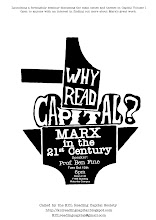1) Vol. I - Next Session: 'The Fetishism of Commodities'
The Volume I group began last week with a discussion on 'Commodities and Values', (which can be downloaded here: http://rapidshare.com/files/430908198/KCLReadingCapital_RobJacksonVolI_November_10_2010.mp3).
Our sessions on Volume I will be every 3 weeks. The next (1st Dec) will be a discussion on 'The Fetishism of Commodities', introduced by former KCL student, Jack Farmer:
Wednesday 1st December
6.30pm
Room tbc
Strand Building
King's College London
'A commodity is therefore a mysterious thing, simply because in it the social character of men’s labour appears to them as an objective character stamped upon the product of that labour; because the relation of the producers to the sum total of their own labour is presented to them as a social relation, existing not between themselves, but between the products of their labour...'
'...This I call the Fetishism which attaches itself to the products of labour, so soon as they are produced as commodities, and which is therefore inseparable from the production of commodities.'
N.B. We will be reading Vol.I, Chapter 1, Section 4 for this meeting.
Facebook event at: http://www.facebook.com/event.php?eid=112044228861591
- -
2) Vol.II - Next Session: 'Time & Costs of Circulation'
The introduction and discussion from our last meeting on 'Circuits of Capital' is available here: http://rapidshare.com/files/429870086/KCLReadingCapital_JonnyJones_November_8_2010.mp3.
As the material was quite lengthy we will be doing a further session discussing chapters 1-4 as well as reading and discussing the 'Time & Costs of Circulation':
Monday 22nd November
6pm
Room S-3.18
Strand Building
King's College London
"We have seen that the movement of capital through the sphere of production and the two phases of the sphere of circulation takes place in a series of periods of time. The duration of its sojourn in the sphere of production is its time of production, that of its stay in the sphere of circulation its time of circulation. The total time during which it describes its circuit is therefore equal to the sum of its time of production and its time of circulation."
N.B. We will be re-capping Vol.II, Chapters 1-4, and reading Chapters 5-6 for this meeting.
Facebook event at: http://www.facebook.com/event.php?eid=117738471623262
Sunday, 14 November 2010
Subscribe to:
Post Comments (Atom)

No comments:
Post a Comment